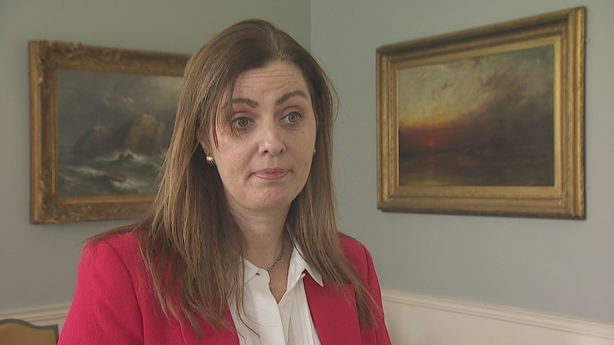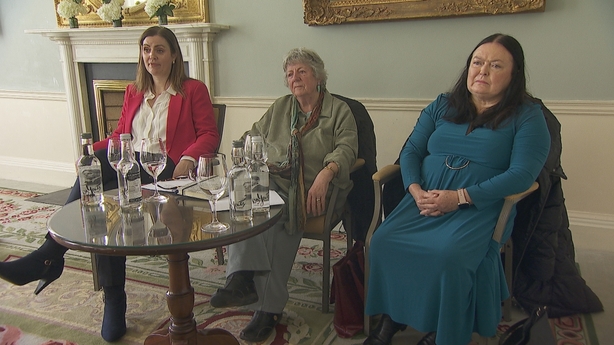Children At Risk Ireland (CARI), the support service for child victims for sexual abuse and their families, has said it will be forced to close its doors unless it is provided with immediate funding from the Government.
CARI, which has been running for 34 years, is the only organisation outside of Dublin that provides long-term therapeutic supports to children affected by child sexual abuse from the age of three.
At a press conference this morning, representatives of CARI said its budget from Tusla had dropped by 55% since 2021, when it received €735,723.
CARI's Executive Clinical Officer Emer O'Neill said the Child and Family Agency confirmed on Monday that it would fund 30% of the charity's €1.1m operating costs next year - which equated to €337,000.
The service, which is currently working with 50 children, has a waiting list of 134. Tusla is the main source of referral of children that require the service.
CARI said child sexual abuse was not an historical problem and nearly 4,000 cases of suspected child physical or sexual abuse were referred to gardaí by Tusla in the first half of 2023.
In response, Tusla said CARI had received €618,000 from the Child and Family Agency this year - with funding projected to reach €700,000 by year end.
It noted that this included the core budget of €336,000 and local funding - provided to respond to local service need.

In a statement, Tusla said it was important to note that it had not reduced CARI's core funding.
"The core agreed funding level remains at €336,000 yearly," it said.
"This is the amount the organisation is funded to operate their core services within.
"Additional services provided to local areas based on local need are funded separately and of course these amounts vary, dependant on both the level of need for such services and the capacity of CARI to deliver these services.
"In addition to core funding, and additional funding for local needs, Tusla also provided a 5% Covid expenditure payment in 2021, and 4% increase to all section 56 organisations core funding for sustainability in 2022."
Tusla acknowledged that over the last number of months, CARI had indicated that the funding allocation was inadequate to deliver their current service model, however, it said it had given an additional €250,000 once off funding (from Tulsa's pay saving measures) to "alleviate current financial difficulties" for 2023.
The aim was to provide CARI with the time it required to "finalise their service model" for 2024 in line with their allocated budget (core funding and local funding), "as is required by all services commissioned by Tusla".
CARI has advised Tusla that the charity will be unable to operate within the budget for 2024 and has notified the Child and Family Agency of its intention to cease operations.

Tusla's CEO Kate Duggan said she recognised the valuable work undertaken by CARI, and said Tusla was "fully committed" to working with the organisation to ensure it would be able to continue to provide services to the 50 children and their families with whom it is working.
"In recognition of their financial situation, we allocated an additional once off payment of €250,000 for 2023, to enable CARI to finalise a funded service model for 2024," she said.
"We were surprised by their response to fully cease operations, and whilst we respect the decision of the Board to cease operations if that’s what they deem necessary, I would continue to encourage the CARI Board to review their service model to ensure they can continue to operate within the allocated funding level."
Last year, CARI provided 3,175 hours of support to 339 people and between January and October, it supported 322 people from as young as three years of age, equating to 2,245 hours.
Ms O'Neill said: "The inadequate funding that CARI already receives means children languish on our waiting list for two to three years.
"With the huge reduction of our core funding from Tusla forcing our closure, the outcomes for these children would be disastrous.
"Without the support they need, child victims of sexual abuse are more likely to experience premature death in adulthood through illness, disease, and suicide."
She said Tusla proposed private therapy for the complex therapy needs of the children in the service, however, she said private therapy was not subject to the same expert oversight, governance, training, and supervision procedures which CARI has in place.
Tusla confirmed it was looking at alternative options to deliver the important services to the children and families who require them if CARI makes the decision to cease operations.
CARI has appealed to Government including the Department of Health, the Department of Children, Equality, Disability Integration and Youth and the Department of Justice to act collectively to prevent the closure of CARI’s services for child abuse victims.
"We urgently need a further funding commitment of €763,000 to sustain our services in 2024," she said.
Without a commitment in respect of the amount CARI needs to remain viable in 2024, the organisation has said that the Board will have to prepare to close its doors when it meets on Friday.






